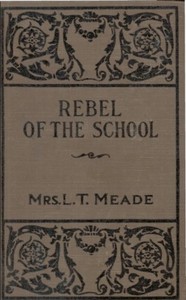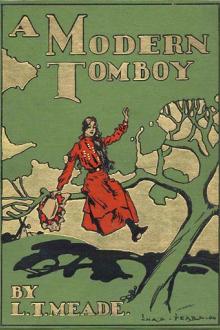The Rebel of the School, L. T. Meade [best historical biographies .txt] 📗

- Author: L. T. Meade
Book online «The Rebel of the School, L. T. Meade [best historical biographies .txt] 📗». Author L. T. Meade
"Yes, madam."
"Kathleen O'Hara is the promoter?"
Again Ruth was silent. Miss Mackenzie glanced at the other ladies. After a pause she continued:
"We will leave that matter for the present. Please write down, Miss Judson"—here she turned to the clerk—"that Ruth Craven has refused to answer my question with regard to Kathleen O'Hara. We will return to that point later on.—Why did you leave the society?"
"I did so because I wanted to join a scheme proposed by a girl who was not a foundationer and not a member of the society. Her name is Cassandra Weldon."
"One of our best and most promising pupils," interrupted Miss Ravenscroft.
"I know her," said Miss Mackenzie. "We have every reason to be proud of Cassandra Weldon.—And so she, this charming and excellent Cassandra Weldon, is your friend, little Ruth Craven?"
"She has been extremely good to me, madam. She offered me the services of her own coach in order that I might work up for the Ayldice Scholarship."
"And do you think you have a chance of getting it?"
"I don't know. I mean to try."
Her dark-blue eyes flashed with intelligence and longing as she uttered these words.
"I think we are now in possession of the facts," said Miss Mackenzie. "Is that not so, Mrs. Ross? Ruth Craven was a member of the objectionable society; she very wisely left it, knowing that she would better herself by doing so.—Now then, Ruth, we expect you to tell us all about the society—where it meets, and as much as you know about its rules. And you must also acquaint us with the names of the girls who are members."
Ruth again was silent, but now she held herself erect and looked full at Miss Mackenzie.
"You hear me, child. Speak. You can make your narrative brief. Where does the society meet? What does it do? What are its rules? Go on; you are not stupid, are you?"
"No, Miss Mackenzie," said Ruth, "I am not stupid; and I am very, sorry indeed to seem rude, but I cannot answer your questions. You know that Kathleen's society exists; that fact I cannot hide from you, but you will not hear anything more from me. It would be a very terrible thing for me to be expelled from this school; it would mean great sorrow to my grandfather and grandmother; but I cannot betray my friend Kathleen, nor any of the other girls of the society."
Miss Mackenzie was silent for quite a minute. The other ladies fidgeted as they sat. Ruth, having delivered her soul, looked down. After a long pause Miss Mackenzie said quite gently:
"Ruth Craven, you scarcely realize your own position. We cannot possibly let a little girl who is rebellious, who keeps secrets to herself which she ought to tell for the benefit of the school, continue in our midst. We will give you three days to think over this matter. If at the end of three days you are still obstinately silent, there is nothing whatever for it but that you should be expelled from the school. Do you understand what that means?"
"It means that I must go, that I shall lose all the advantages," said Ruth.
"It means that and more. It means that in the presence of the whole school you are pronounced unworthy, that you leave the school publicly, being desired to do so by your teacher. It is an unpleasant ceremony, and one which you will never be able to forget; it will haunt you for life, Ruth Craven. I trust, however, my dear child, that such extreme measures will not be necessary. You think now that you are honorable in making yourself a martyr, but it is not so. We who are old must know more than you can possibly know, Ruth, with regard to the benefits of a great establishment like this. Insurrection must be put down with a firm hand. You will see for yourself how right we are, and how wrong and silly and childish you are.—Miss Ravenscroft, a special meeting of the governors will take place in this room on Saturday morning. This is Wednesday. Until then we hope that Ruth Craven will carefully consider her conduct, and be prepared to answer the very vital questions which will be put to her.—You can go, Ruth."
Ruth left the room.
"An extraordinary child," said Miss Mackenzie.
"A sweet child, I call her," said Mrs. Naylor. "What a beautiful face!"
"My dear Mrs. Naylor, does the beauty of Ruth Craven's face affect this question? She is, in my opinion, extremely silly, and a very naughty child.—Miss Ravenscroft, we leave it to you to bring the little girl to reason. I have known her grandfather ever since he kept a grocer's shop in the High Street. I have respected him more than any man I ever knew. This child in appearance is one of Nature's ladies, but we must get her to see things in the right light, and if necessary she must be made an example of. It will be very painful, but it must be done."
"I will do what I can," said Miss Ravenscroft; "but from the little I have seen of Ruth, I imagine she would go to the stake before she would betray those who are kind to her. I will, however, confide in Cassandra; she is extremely fond of Ruth, and she may influence her where others fail. I can't help saying, Miss Mackenzie, that it would be a very terrible thing, and would, I believe much injure the school, if a girl like Ruth were expelled. The other foundationers would feel it; there would be a sense of martyrdom. Sides would be taken for and against her. I trust that this extreme step will not be necessary."
"If she does not tell us what she knows, it will be not only necessary, but it will be carried into effect, and in my presence," said Miss Mackenzie. "But now to return to the more immediate business. You say these girls meet in a quarry?"
"I have heard rumors to that effect."
"Do you think they meet there every night? Are their scandalous proceedings a nightly occurrence?"
"Oh, no; I do not think they meet oftener than once a week."
"Have you any idea what night they choose?"
"I am rather under the impression that this is the night."
"Then send some one to see, Miss Ravenscroft. One or two of the teachers would be the best. They could go to the quarry to-night and wait there in order to see if the girls arrive. If they do, my orders are that they take no apparent notice of them, but write down the names of all present. If that can be done, and you are successful in finding the girls, we shall have the matter, as it were, in a nutshell, and we shall soon crush this disgraceful rebellion."
"And what about Kathleen?" asked Miss Ravenscroft.
"There is very little doubt that she will have to be expelled. Such a girl as that is a firebrand in a school, and however rich she may be, and however well-born, the sooner she leaves us the better."
CHAPTER XXI. THE SOCIETY MEETS AT MRS. CHURCH'S COTTAGE.That evening at about a quarter to eight a band of perfectly silent girls might have been seen walking along the road that led to Mrs. Church's cottage. They walked as much as possible on the grass, and glided in single file. Each one, as they expressed it, had her heart in her mouth. Occasionally they looked behind them; sometimes they started at an ordinary shadow, thinking that a policeman at least would be waiting for them. The foundationers who called themselves the Wild Irish Girls had very little doubt what it would mean if their scheme was discovered. They knew, of course, that Miss Ravenscroft would be furiously angry, that the governors would have something to say to them, and that they might be dismissed from the school unless they promised to cease to belong to the society. Perhaps there were worse things than that. There was a timid little girl called Janey Ford, who whispered to her friend that the Wild Irish Girls belonged to the rebels in Ireland, and that it might be considered necessary by the government of the country to have them taken up and put into prison. Nobody for a single moment believed Janey Ford's silly remarks, but nevertheless they gave a sort of thrill to the occasion. It was all delightful, this stealing away in the dark, this pressing one against another as they walked down the little road. And then Kathleen was so fascinating; her eyes were so bright; she was such a valiant sort of leader. If they were men and she was a man, Janey Ford had whispered to her great friend Edith Hart, they would follow her to the death.
"We'd form a crusade for her," Edith had whispered, back. "She is magnificent."
And then both girls felt the little heart-shaped lockets round their necks and thought of themselves as heroines.
The entire party, numbering about forty-three in all, arrived at the cottage. Susy suddenly put in her appearance.
"Girls," she said, "it isn't at all certain that we are safe. I saw a man going by not ten minutes ago, and he looked suspiciously at the house. Miss Ravenscroft would do anything to catch us; but Aunt Church says that if you go into the yard she doesn't think you will be seen or heard.—May I take the girls into the yard, Kathleen? And may I take you and Miss O'Flynn into the house to see Aunt Church?"
Kathleen nodded in reply. She also felt excited and pleased and completely carried out of herself.
Susy ushered her visitors with great pride and pomp into Mrs. Church's little sitting-room. Really she felt herself quite rising in the social scale as she saw her old relative dressed in her best, with the manners she used to wear when she was housekeeper at Lord Henshel's, and with that most appetizing, most recherché tea on the table.
"I will be back in a minute," said Susy.—"Aunt Church, here they are, and I know you will give them welcome."
"I am proud to do that," said Mrs. Church. "I presume I am talking to Miss O'Flynn? Will you take a chair here by the fire, miss? I'm afraid the night is a little bit chilly.—Miss Kathleen, I wish I could get up and offer you a seat, but as it is—"
"Oh, nonsense!" said Kathleen. "What are young legs for if not to wait on old legs? Oh, what a heavenly, delicious tea! What is that I see? Honey! Oh, don't I just adore honey? Don't you, Aunt Katie?"
"That I do," said Miss O'Flynn; "and I eat it comb and all. It never yet disagreed with me; but then I've got the digestion of an ostrich."
"Indeed, then, madam, I think you are rather silly to eat the comb," said Mrs. Church; "and you ought always to put butter on your bread when you eat honey. My poor mother told me so, and I have always followed in her steps. If you butter your bread and don't eat the comb, honey agrees with you as well as anything else."
"Mrs. Church," said Kathleen, "you are perfectly sweet, and I can't tell you how grateful we are; but we are in something of a hurry, so perhaps you wouldn't mind telling the rest of that story about butter and honey to Aunt Katie when you are in Ireland. Have you made the tea, Mrs. Church? Shall I make it?"
"The tea is in that little brown caddy," said Mrs. Church, "and there's a measuring spoon close to it. I allow—"
"Oh, I know," said Kathleen.
She began to ladle out spoonful after spoonful and put it into the little brown teapot, which she then filled up with hot water. Mrs. Church looked on with a mingled feeling of approval and disapproval. She was being carried completely off her feet. She to give up her dear little neat house in this reckless way; she to give up her most precious tea to be absolutely wasted and practically lost—for Kathleen put in quite three times too much tea into the little teapot; she to forgive Susy's mother two months of that debt which she owed her. Oh, what did it mean? She was going to be ruined in her old age!
"I'd just like to say, miss," she said, looking at Miss O'Flynn and then at Kathleen—"I'd like to say that I am willing to help the young ladies, and the old ladies too for that matter, but





Comments (0)